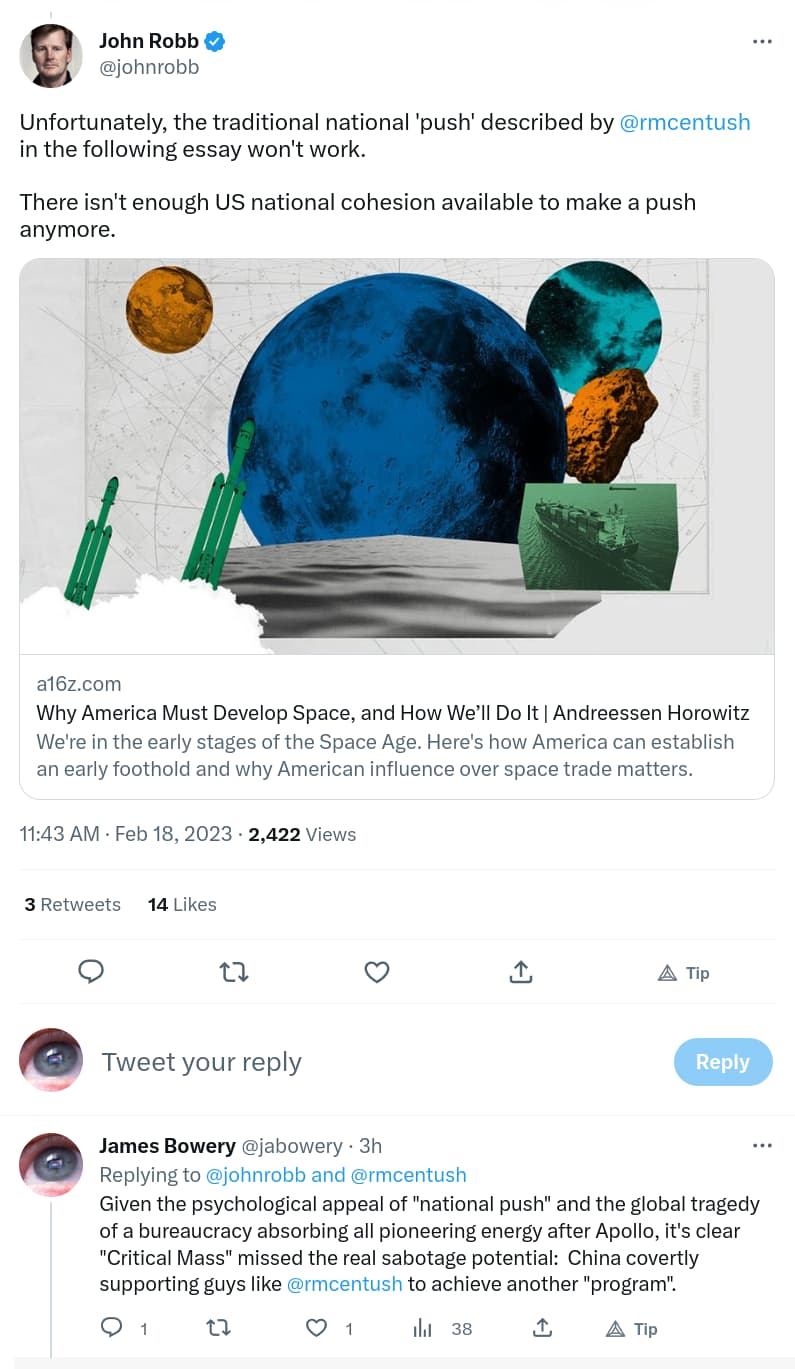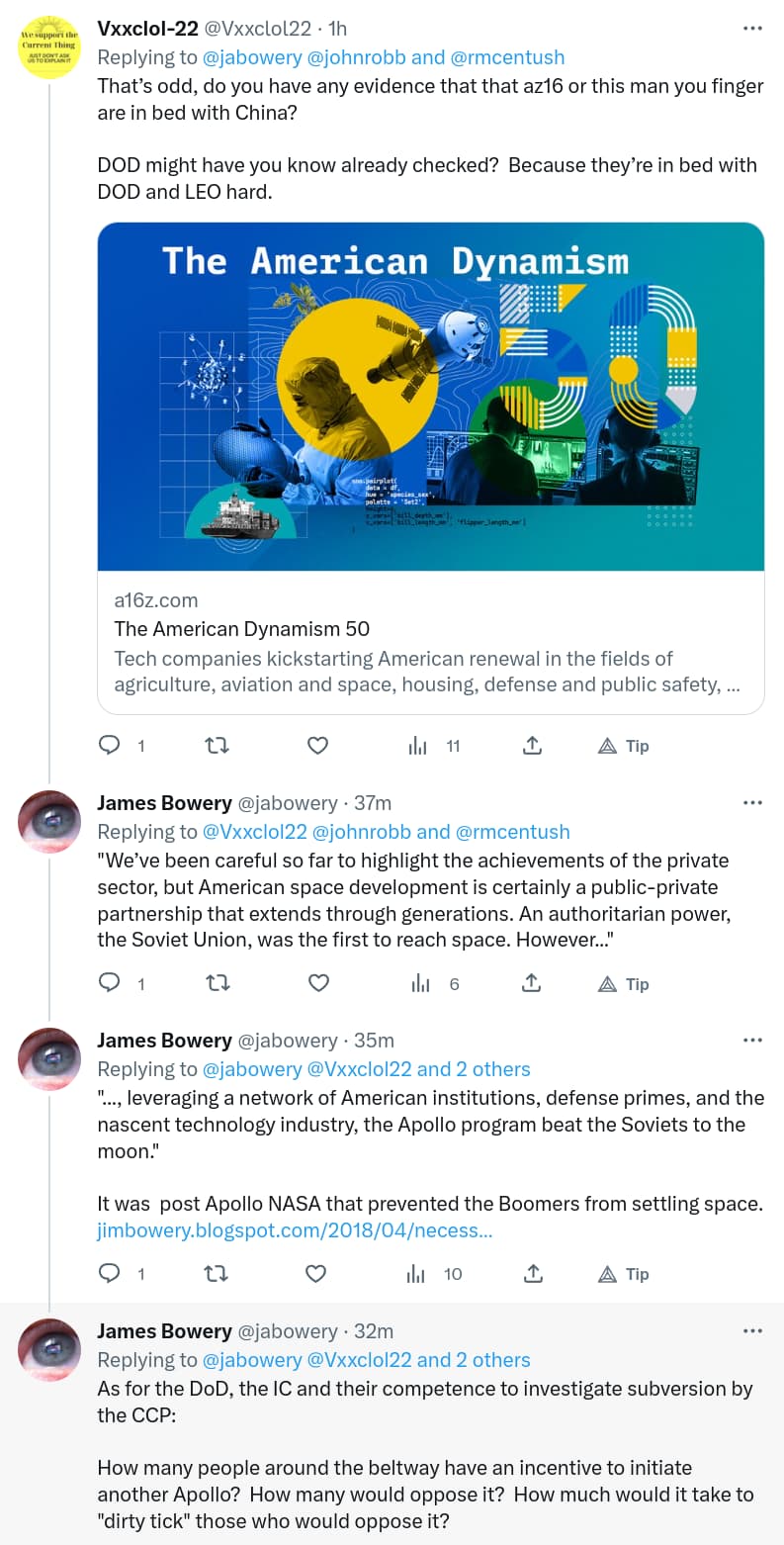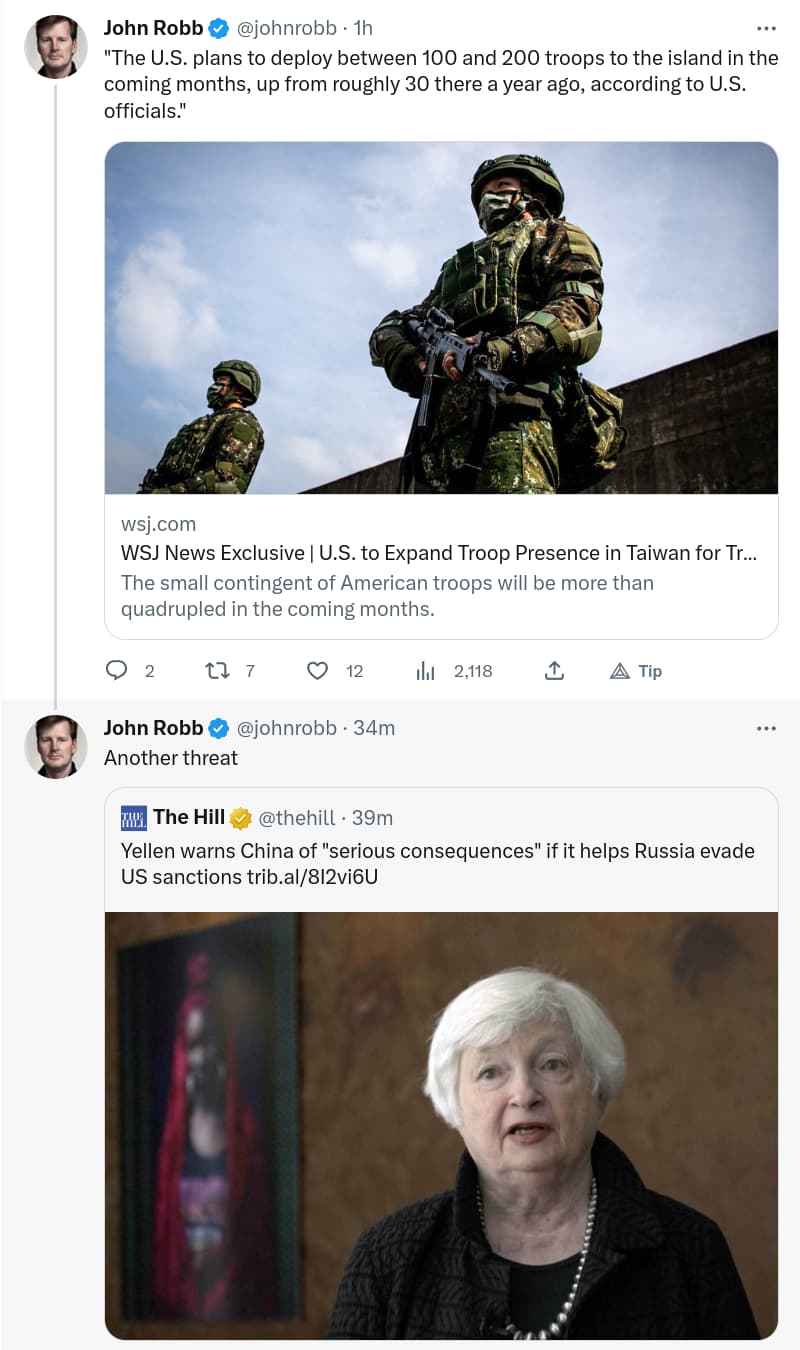Thank You. The Ice Sheets on North America melted before a human existed! And though I hear it bandied about—I do not live in a greenhouse! ![]()
There have been some interesting proposals for in-situ propellant production on the Moon, which are summarised in the Lunarpedia page “In-Situ Propellant Production”. If the lunar base has access to abundant high energy (as from a nuclear reactor, solar power satellite as envisaged in Daniel Suarez’s Critical Mass, or a solar furnace operating during the lunar day), extraction of oxygen from lunar regolith is straightforward, as it is the most abundant element. The main problem is that other common components of propellants such as hydrogen and carbon are extremely scarce (except for water ice deposits only found in shadowed craters at at the lunar poles), and would not be accessible without massive mining and processing of regolith, perhaps as a by-product of mining for Helium-3 as a fusion fuel.
But there are a lot of things that will burn in oxygen, such as silicon and aluminium, which are the second and third most abundant elements in lunar soil. Theoretical I_{\rm sp} for both, burned as a fine powder with LOX, is around 285 seconds, and NASA has actually tested [PDF] a subscale aluminium/LOX engine that produced around 125 seconds. Sulphur makes up around 0.27% of some mare soils on the Moon, melts at 115° C, and also produces around 285 seconds with LOX.
None of these have the elegance of a solar-powered mass driver, but may be useful in bootstrapping export of lunar resources and for applications such as kick motors for payloads launched by a mass driver.
Back in the early space colony days, kick motors were not considered for lunar mass drivers. They used a catcher, which Tom Heppenheimer likened to being hit by a steady stream of 18th-century cannon balls. It was a very difficult business, required the invention of achromatic orbits, and the mass driver was restricted to one location on the moon. Modern fast semiconductors should make this easier, but no serious work has been done for decades.
Although Google doesn’t easily turn up any results, IIRC my ancient, if apocryphal, history, a silane rocket once went haywire and broadcast crystals around GEO resulting in a period of time when solar panels of communications satellites were losing cells.
Here is a link to the cited Andreessen Horowitz article, “Why America Must Develop Space, and How We’ll Do It”. The (funny-)money quote:
Space is far too important to simply cede development to others. Control of this new sea and development of the space industrial base are paramount toward the continued strength of the United States, and the prolonging of a world of free markets and liberal democracies.
Ummm…would that be the “continued strength” of the railroad-era, continental-scale, resource-extraction empire that is US$ 31.5 trillion in debt, spends more yearly servicing that debt (at a time of historically low interest rates) than the combined military spending of China, India, the United Kingdom, and Russia combined, and spent eleven years and more than US$ 55 billion (2022 dollars, SLS+Orion) developing a throwaway “Mega Moon Rocket” built of used Space Shuttle parts that costs US$ 2 billion a shot after writing off development cost?
Yep, that’s what’s needed—a “public-private partnership” to open up the solar system to human settlement!
Nailed it.
There are probably folks like Musk who understand that they need to blather zombie-speak like “public-private partnership” so as to appear unthreatening. But look at Musk’s slip-ups: saying things about not wanting to get people mad at him when talking about stuff like SLS. That is quite ill-advised given the heightened sense of smell for !!!BRAINS!!! zombies have. It is really difficult to palaver in The King’s Zombie-Speak while at the same time keeping one’s “engineering hat” on.
Years ago, it came to my attention, through responses to Andreesen such as JohnDylan’s recent comment, that Andreessen doesn’t want me seeing his posts. I can only hope that Andreesen et al are engaging in zombie speak and blocking guys like me so as to cover any residual smell of !!!BRAINS!!! that might slip by their “engineering hats”.
I ran across this “The Lunar Society” interviewer because he’d just interviewed Andreessen who had recently gone technosocialist about space. The topic of this interview is “Georgism” and a lot of it is about the way land rent seeking is harming Silicon Valley/San Francisco:
Here’s my comment on that video:
After our grass-roots libertarian coalition centered in the San Diego L5 chapter got the Launch Services Purchase Act of 1990 signed into law, it became apparent that risk aversion of capital was at the root of technological stagnation. Since I’d been friends with Jeff Smith of the SD Georgists, and had read George Gilder’s books on Reganomics, I looked seriously at what tax reform would break up the log-jam.
My conclusion was that Georgists were largely correct in the abolitionist ideal of shifting tax off of human capital (income) and onto recovering positive network externalities to enhance human capital (citizen’s dividends). But they needed a more principled notion of economic rent that would provide a continuous measure across all forms of capital. Essentially, this means defining “economic rent” as the income on liquidation-value of capital due to the risk free interest rate – the interest rate on the national debt.
Of course, no one had ever come up with this idea before so I was, and remain, alone in this insight. But I did circulate a white paper around DC thinktanks on the idea titled “A Net Asset Tax Based On The Net Present Value Calculation and Market Democracy”. The response to that white paper got me thinking about issues like the plummeting total fertility rates in the developed world, wiping out the gene pool by outbidding young men – those most in need of animal “territory” – for the fertile years of young women.
That’s when I realized the problem is rooted in the way the monopoly on currency is a rent seeking enterprise, most egregiously represented by the Federal Reserve’s deadly embrace with Wall St. and the DC beltway with its surrounding counties having the highest median income in the US.
This is not a problem that can be fixed short of a collapse. Sorry folks.
After interacting with one of Andreessen*'s “military commanders” on Twitter, it hit me this morning, that moving to China to contribute to the CCP space effort might be “optimal” as in the least Circle of Hell now available to The Nation of Settlers.
As I was telling folks back in the late '80s, the Soviets were outperforming the US in space because NASA just couldn’t compete as a communist agency because the commies are Pros at being commies: They shoot their corrupt bureaucrats!
But China has another big advantage over the US:
It doesn’t have the world’s reserve currency pumping Fetanyl into the veins of its leaders, unlike the US with zombies like Yellen pushing the world into nuclear war with Russia – and now China:
If Andreessen succeeds with his “public-private partnership” – bringing on board the US “military” to create another Apollo program, the “military commander” I interacted with made it pretty clear where this is heading:
This time to go to space PERMANENTLY! Trust us!
We’re the military so we’re better at being commies than NASA!
We’ll HELP guys like Musk!
This hierarchy of monetary Fetanyl junkies needs to be hauled off to The Great Shopping Mall In The Sky. If guys like Andreessen succeed in leap-frogging Musk by inducting the disaffected portions of the US “military” with this “public-private partnership” vision of space settlement, Musk is likely to go the way of Bezos with his “public-private partnership” that I predicted, at the time, would neutralize Bezos, as indeed it has. In that event, who is left to construct the “habitats” for all those monetary Fetanyl junkies?
God save Musk from the fate Bezos suffered!
* When I say “Andreessen” I am, of course, referring not necessarily to the coporeal being known as “Marc Andreessen” since it appears he has succummed to a lesser form of monetary Fetanyl that afflicts any capitalist society that shifts the cost of property rights protection off of property rights and onto economic activity: monopoly capitalism.
In volume 4 of Boris Chertok’s Rockets and People, he observes that the Soviet Moon program lost out to the U.S. because Apollo was a centrally-planned top-down national priority, while the Soviet program had all of the competition, waste, and duplication of effort good Marxists consider defects of a market economy. From my review (linked above):
When I read [space historian Asif A. Siddiqi’s] Challenge to Apollo, what struck me was the irony that the Apollo program was the very model of a centrally-planned state-directed effort along Soviet lines, while the Soviet Moon program was full of the kind of squabbling, turf wars, and duplicative competitive efforts which Marxists decry as flaws of the free market. What astounded me in reading this book is that the Soviets were acutely aware of this in 1968. In chapter 9, Chertok recounts a Central Committee meeting in which Minister of Defence Dmitriy Ustinov remarked:
…the Americans have borrowed our basic method of operation—plan-based management and networked schedules. They have passed us in management and planning methods—they announce a launch preparation schedule in advance and strictly adhere to it. In essence, they have put into effect the principle of democratic centralism—free discussion followed by the strictest discipline during implementation.
It’s interesting that the Soviets couldn’t discipline their corrupt bureaucrats at the start of the space race, but they did eventually get their “culture” back on track.
Apollo was essentially a military campaign and military campaigns are a classic hare to the sustainable tortoise peacetime order. In essence, military campaigns harvest peacetime wealth and even mine out the soil’s fertility. The US had a lot more of it at the start of Apollo than did the Soviets and would have been far wiser to simply declare war on the Soviets than to initiate a “civilian” monstrosity. Apollo created a permanent, militarized form of NASA but without the military traditions that keep military discipline – which is why when the 1980s rolled around, the Soviets were beating the US in terms of cost per mass to LEO.
So, yeah, I can imagine that the Soviets, having denuded their private sector (ie: “peacetime economy”) had very little economic vitality left to consume during their response to having woken a sleeping giant with Sputnik – that plus it not being under direct military threat from some idiot deciding to “March On Moscow”, they didn’t have the cultural triggers they needed.
Project mismanagement will always be with us, just like poor people. And history clearly shows that military organization can be just as iffy as civilian organization.
Let’s remember that NASA’s Moon shot was the primary reason for the “Brain Drain” from Europe & Asia for almost a decade. If NASA had had to rely on purely homegrown talent, maybe the Moon landing would have taken longer and been more expensive. Perhaps one of the reasons the US won the race to the Moon was the then ability of the US to attract global talent – something that the USSR definitely lacked. But that was then, and this is now.
I disagree.
I knew Bob Truax.
If the US had simply offered a series of prizes for milestones toward the first man on the moon, it would have been accomplished with Truax’s Sea Dragon – financed by someone like Howard Hughes.
But then there is no “Control USA” for me to refer to in making the case for my macrosocial theory of causality, is there? Hence my repeated insistence that we either be permitted to allocate territory according to assortative migration of proponents of different social theories or – failing that (because it’s just “too inefficient” (hehe)) – then invest the proper amount of money in lossless compression of a wide range of longitudinal social measures to discover causality.
That we are denied BOTH is unforgivable and is the reason the West is heading into a rhyme with the 30 Years War.
These are existential issues.



